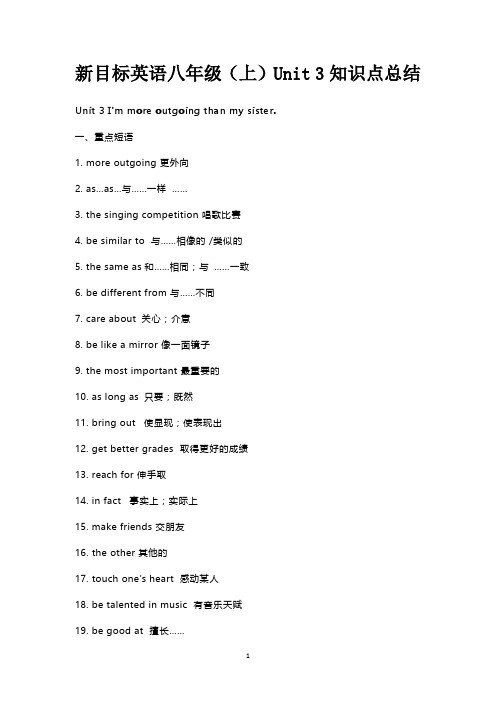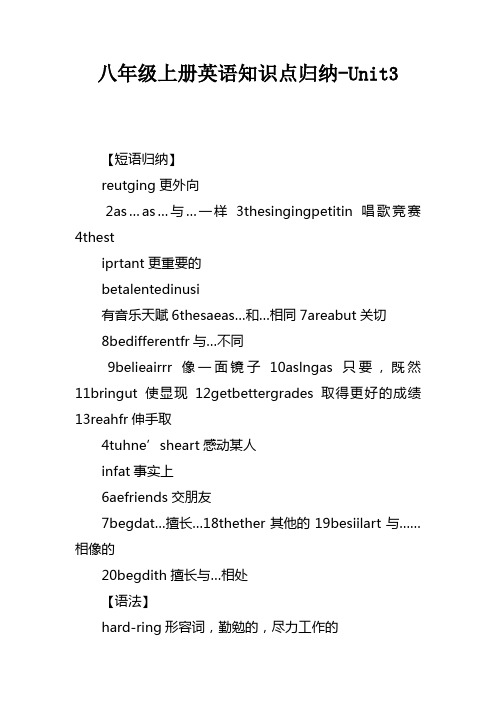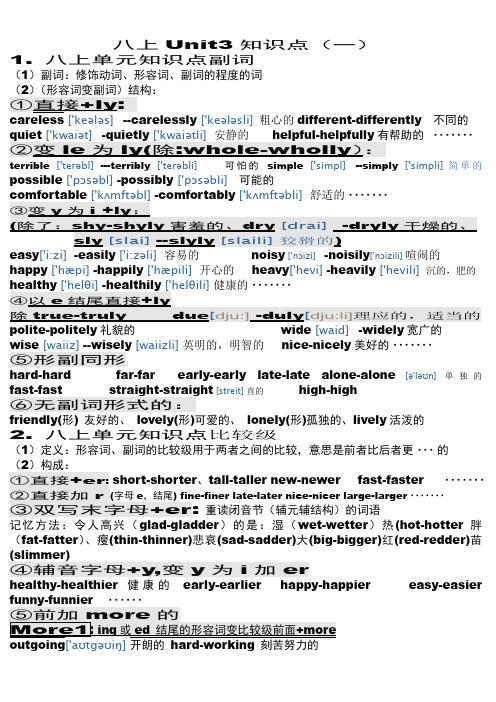八年级上册英语Unit3知识点总结
人教版八年级上册英语Unit 3知识点梳理及语法讲义(教师版)

八年级上册英语Unit 3知识点与语法精讲精练词汇梳理(一)完成单词梳理:名词:1. competition比赛;竞赛 2. mirror 镜子 3. kid 小孩;年轻人4. grade 成绩等级5. hand 手6. saying 谚语;格言7. heart 内心;心脏8. fact 现实;事实9. information 信息;消息10. arm 手臂;上肢动词:1. win 获胜;赢 2. care 在意;关心 3. should 应该;应当4. reach 伸手;到达5. touch 感动;触摸6. break 损坏7. share 分享;共享;共用副词:1. loudly 喧闹地;大声地;响亮地 2. quietly 轻声地;轻柔地;安静地3. clearly 清楚地;清晰地;明白地4. truly 真正;确实形容词:1. outgoing 爱交际的;友好的;外向的 2. hard-working工作努力的;辛勤的3. fantastic 极好的;了不起的4. talented 有才能的;有才干的5. serious 严肃的;稳重的6. necessary 必需的;必要的7. loud 响亮的;大声的8. similar 相像的;类似的9. primary 最初的;最早的兼类词:1. both (adj/pron)两个;两个都2. better (adj/adv)较好的(地);更好的(地)3. which (pron/adj)哪一个;哪一些4. though (adv)不过;可是;然而(conj)虽然;尽管;不过5. laugh (v)笑;发笑(n)笑声(二) 词汇变形小结:1. good/well (adj/adv. 好的) — better (比较级) — best (最高级)2. loud (adj. 大声的) — loudly (adv.喧闹地)3. quiet (adj. 安静的) — quietly (adv. 安静地)4. competition (n. 竞争;比赛) — compete (v. 竞争;比赛)5. clearly (adv. 清楚地;清晰地) — clear (adj. 清楚的;清晰的)6. win (v. 赢;获胜) — won (过去式) — winner (n. 获胜者)7. talented (adj. 有才能的) — talent (n. 才能;天赋)8. truly(adv. 真正;确实) — true (adj. 真正的) — truth (n. 真实;真相)9. care(v. 在意;关心) — careful (adj. 认真的;细心的)10. serious(adj. 严肃的;稳重的) — seriously (adv. 严重地;严肃地)11. say(v. 说) — saying (n. 谚语;格言)12. touch(v. 感动;触摸) — touching (adj. 令人感动的) — touched (adj. 感动的)13. break(v. 破坏) — broke (过去式)【练一练】用所给词的适当形式填空1.Class Six won (win) the basketball game but our class lost the game.2.My friend likes telling jokes. He often makes us laugh (laugh)happily.3.Be quiet (quietly)! I have something important to tell you.4.I think Linda dances better (well) than Kate.5.Students can’t speak loudly (loud) in the library.6.Although he is only two years old, he can speak clearly (clear).7.The teacher told us to find out some information (information)about our country and share it next week.8.I’m truly (true) sorry that things had to end like this.st night we saw a movie and it made us touched (touch).10.I don't think differences (different) are important in a friendship.(三) 短语攻关:care about关心;在意be talented in 在……有天赋both...and...……和……都play the drums 敲鼓the singing competition 歌唱比赛be similar to 与……相像的bring out 使显现the same as 和……相同be different from与……不同as long as 只要in fact 事实上primary school 小学get good grades 取得好成绩have fun doing sth 做某事很开心make sb do sth 让某人做某事want to do sth 想要做某事make friends 交朋友be like 像……一样知识点梳理1.Both Sam and Tom can play the drums, but Sam plays them better than Tom. 萨姆和汤姆都会敲鼓,但是萨姆比汤姆敲得好。
新目标英语八年级(上)Unit 3知识点总结

新目标英语八年级(上)Unit 3知识点总结Unit 3 I'm more outgoing than my sister.一、重点短语1. more outgoing 更外向2. as…as…与……一样……3. the singing competition 唱歌比赛4. be similar to 与……相像的 /类似的5. the same as和……相同;与……一致6. be different from 与……不同7. care about 关心;介意8. be like a mirror 像一面镜子9. the most important 最重要的10. as long as 只要;既然11. bring out 使显现;使表现出12. get better grades 取得更好的成绩13. reach for 伸手取14. in fact 事实上;实际上15. make friends 交朋友16. the other 其他的17. touch one’s heart 感动某人18. be talented in music 有音乐天赋19. be good at 擅长……20. be good with 善于与……相处21. have fun doing sth. 享受做某事的乐趣22. be good at doing sth 擅长做某事23. make sb. do sth. 让某人做某事24. want to do sth. 想要做某事二、必背重点句1. Sam has longer hair than Tom.= Sam’s hair is longer than Tom’s. Sam 的头发比Tom的长。
2. I’m taller now than I was 2 years ago = I was shorter 2 years ago than I am now.现在的我比两年前更高。
仁爱英语八年级上册Unit3知识点

仁爱英语八年级上册Unit3知识点本文将详细介绍仁爱英语八年级上册Unit3的知识点,包括重要的单词、表达方式以及语法结构等。
帮助学生更好地掌握此单元的知识,顺利完成学习任务。
一、重要单词1. grade 年级2. schedule 时间表3. term 学期4. memorize 记忆5. revise 复习6. grab 抓住7. cheat 作弊8. summarize 总结9. assignment 作业10. participate 参加二、表达方式1.询问日程安排What’s your schedule like tomorrow?明天你的日程安排怎么样?2. 描述个人喜好及习惯I like studying English every morning.我喜欢每天早上学习英语。
3. 表达自己的看法In my opinion, English is not too difficult.在我看来,英语并不是太难。
4. 建议You should practice speaking English more often.你应该经常练习说英语。
5. 感叹What a difficult test it is!真是一张难题卷!三、语法结构1. 现在进行时现在进行时表示正在进行的动作或状态,常与now、at the moment连用。
例如:I’m doing my homework now.我正在做作业。
2. 过去完成时过去完成时表示过去某一时刻或动作之前完成的动作。
例如:By the time the party began, I had finished my work.派对开始时,我已经完成了自己的工作。
3. 定语从句定语从句用来修饰名词或代词,常用关系代词who、whom、that、which引导。
例如:The girl who is sitting next to me is my sister.坐在我旁边的女孩是我妹妹。
八年级上册英语unit三知识点总结

八年级上册英语unit三知识点总结在八年级上册英语课程中,unit三是一个重要的单元。
本文将总结unit三的主要知识点,包括语法、词汇和阅读理解等方面。
一、语法1.现在进行时现在进行时表示现在正在进行的动作。
构成:be+现在分词(-ing)。
如:I am reading a book.(我正在看书。
)2.一般将来时一般将来时表示将来的动作或状态。
构成:will+动词原形。
如:I will go shopping tomorrow.(我明天去购物。
)约定时间或计划安排时用现在进行时+表示将来时间。
如:We are meeting at six tomorrow evening.(我们明天傍晚六点见面。
)3.被动语态被动语态表示动作的承受者,通常情况下使物体作主语,谓语动词用be+过去分词(-ed)。
如:The book was written by him.(这本书是他写的。
)二、词汇1.常见动词play(玩)、walk(散步)、jog(慢跑)、cycle(骑自行车)、swim(游泳)、dance(跳舞)、sing(唱歌)、listen(听)、draw(画画)、read(读)、write(写)、speak(说话)、learn (学习)、teach(教)、watch(看)等。
2.常见地点school(学校)、park(公园)、cinema(电影院)、library (图书馆)、supermarket(超市)、hospital(医院)、museum (博物馆)、post office(邮局)等。
3.常见习惯描述词汇always(总是)、usually(通常)、often(经常)、sometimes (有时)、not often(不经常)、hardly ever(很少)、never(从不)等。
三、阅读理解本单元阅读理解主要涉及四则运算和图表解释,详见教材P39和P40。
四、写作本单元写作主要涉及书信和短文。
八年级上册英语知识点归纳Unit3

八年级上册英语知识点归纳-Unit3【短语归纳】reutging更外向2as…as…与…一样3thesingingpetitin唱歌竞赛4thestiprtant更重要的betalentedinusi有音乐天赋6thesaeas…和…相同7areabut关切8bedifferentfr与…不同9belieairrr像一面镜子10aslngas只要,既然11bringut使显现12getbettergrades取得更好的成绩13reahfr伸手取4tuhne’sheart感动某人infat事实上6aefriends交朋友7begdat…擅长…18thether其他的19besiilart与……相像的20begdith擅长与…相处【语法】hard-ring形容词,勤勉的,尽力工作的hardr辛苦的工作rhard尽力工作Thehard-ringbalasdeshardrandrshard2uantellthatLisareallantedtin,thughin此处用作不及物动词,意为赢,获胜,in还可用作及物动词,意为在…中获胜,其后的宾语为竞赛的项目,奖品或战争。
Beat为打赢,战胜,用于竞赛时,其宾语为所战胜的对手。
3begdat=dellin4ell,arandherbestfriendarebthtallBth代词,意为二者都。
作主语时谓语动词用复数,通常位于连系动词,助动词或青苔动词以后,行为动词之前。
Bthf+人称代词的宾格或复数名词(接复数名词时f通常省略)BthAandBA和B都。
That’shIliereadingbsandstudingharderinlass那确实是我在堂上喜爱念书,学习更刻苦的缘故。
That’sh…意为那确实是。
的缘故,h引导的句子作表语,是表语从句。
2Larrisuhlesshard-ing,thughLess用于形容词或副词之前,意为不如,不及,常见结构为less+形容词/副词+than,相当于ntas/s…as…另外,less仍是形容词little的比较级,意为较少的,更少的。
八年级上册英语知识点总结unit3

八年级上册英语知识点总结unit3八年级上册英语知识点总结Unit 3Unit 3主要涉及关于语法、单词和短语方面的知识点。
以下是这个单元的详细内容。
句型1. 主语+be+形容词:这种句型用于表达人或事物的特征或状态。
例如:The weather is nice today. (天气今天很好。
)2. There be+名词单数/复数:这种句型用于表达某物或某人存在或发生。
例如:There are some books on the shelf. (书架上有一些书。
)3. 主语+动词(否定式)+其他。
例如:He doesn't like basketball. (他不喜欢篮球。
)4. 动词+宾语+间接宾语:这种句型用于表达给某人或某物做某事。
例如:I bought her a gift. (我给她买了一份礼物。
)时态1. 现在完成时:这种时态用于表达从过去某个时间点持续到现在的时间。
例如:I have read this book before. (我以前读过这本书。
)2. 现在完成进行时:这种时态用于表达从过去某个时间点开始持续到现在一直在进行的某个动作。
例如:I have been studying English for eight years. (我已经学了英语八年。
)单词和短语1. 词汇: 这个单元主要涉及关于天气和自然界的词汇,如:cloudy, sunny, rainy, windy (云,阳光,雨,有风). 另外,也包括其他主题的词汇如:wool, cotton, leather, clothes, bag (羊毛,棉花,皮革,衣服,袋子).2. 短语: 一些常用短语也在这个单元讨论,比如:take photos, go skiing, go fishing, go hiking, take a walk (拍照,滑雪,钓鱼,远足,散步).以上便是八年级上册英语知识点总结unit3的全部内容。
Unit3知识点 人教版英语八年级上册

八上Unit3知识点(一)1.八上单元知识点副词(1)副词:修饰动词、形容词、副词的程度的词①直接+ly:careless ['keələs] --carelessly ['keələsli] 粗心的different-differently 不同的quiet ['kwaiət] -quietly ['kwaiətli] 安静的helpful-helpfully有帮助的·······:②变le为ly(除:whole-wholly)terrible['terəbl]---terribly ['terəbli]可怕的simple['simpl] --simply ['simpli] 简单的possible ['pɔsəbl] -possibly ['pɔsəbli]可能的comfortable ['kʌmftəbl] -comfortably ['kʌmftəbli] 舒适的·······③变y为i +ly:(除了:shy-shyly害羞的、dry [drai] -dryly干燥的、sly [slai] --slyly [slaili] 狡猾的)easy['i:zi] -easily ['i:zəli] 容易的noisy ['nɔizi] -noisily['nɔizili] 喧闹的happy ['hæpi] -happily ['hæpili] 开心的heavy['hevi] -heavily ['hevili]沉的,肥的healthy['helθi]-healthily['helθili]健康的·······④以e结尾直接+ly除true-truly due[dju:] -duly[dju:li]理应的,适当的polite-politely礼貌的wide [waid] -widely宽广的wise [waiiz] --wisely [waiizli] 英明的,明智的nice-nicely美好的·······⑤形副同形hard-hard far-far early-early late-late alone-alone[ə'ləʊn]单独的fast-fast straight-straight [streit] 直的high-high⑥无副词形式的:2.八上单元知识点比较级(1)定义:形容词、副词的比较级用于两者之间的比较,意思是前者比后者更···的(2)构成:①直接+er: short-shorter、tall-taller new-newer fast-faster ·······②直接加r (字母e,结尾) fine-finer late-later nice-nicer large-larger·······③双写末字母+er:重读闭音节(辅元辅结构)的词语记忆方法:令人高兴(glad-gladder)的是:湿(wet-wetter)热(hot-hotter胖(fat-fatter)、瘦(thin-thinner)悲哀(sad-sadder)大(big-bigger)红(red-redder)苗(slimmer)④辅音字母+y,变y为i加erhealthy-healthier健康的early-earlier happy-happier easy-easier ⑤前加more的More1: ing或ed 结尾的形容词变比较级前面+moreoutgoing['aʊtɡəʊiŋ]开朗的hard-working 刻苦努力的interesting ['intrəstiŋ]—interested ['intrəstid] (有趣的)surprising [sə'praiziŋ] --surprised [sə'praizd] (惊讶的)relaxing [ri'læksiŋ]—relaxed [ri'lækst] (放松的)boring-bored(枯燥的) tiring ['ta iər iŋ]—tired ['taiəd] (劳累的) exciting—excited(刺激的) talented ['tæləntid]有才能的·······More2:形容词后+ly 变成副词的前面+morequickly快的carefully 小心的quietly['kwaiətli] 安静的seriously ['sɪəriəsli]严肃的 happily 快乐的luckily 幸运的·······注意:friendly—friendlier lovely—lovelier lonely ['ləʊnli] --- lonelier ['ləʊnliə] More3:多音节词和部分双音节词(1)7个字母以及7个字母以下的词语:比较级加more的顺口溜:现代流行怕细心modern ['mɔdn]popular['pɔpjələ] afraid[ə'freid]careful['keəfl]严紧(紧张的)诚实用耐心serious ['siəriəs] nervous[ˈnɜ:vəs]honest ['ɔnist] useful(或useless) patient ['peiʃnt]经常(正常的)(常见的)积极有帮助often['ɔfn] normal[ˈnɔ:ml] common/kɔmən/ active ['æktiv]helpful(helpless)基本出名古得开自然无害地加fun和upset (沮丧的)basic ['beisik] 、famous、ancient[ˈe inʃənt]open ['əʊpən] natural[ˈnætʃrəl]harmless (harmful)fun upset (2)8个字母以及8个字母以上的词的比较级全部加more ⑥不规则的特殊记忆well -----better bad或badly--------worse ][wə:s] little—----less far---—farther或further['fə:ðə] 更远的八上单元知识点①“····比较级than····”:····比···“···数字times+比较级+than····”:···是···的几倍(一倍once两倍twice+times)···比较级than any other + 单数名词:比其他任何都··今早我起得比我妈早。
八年级上册人教版英语unit3知识点

八年级上册人教版英语unit3知识点Unit3主要讲述了有关时间和计划的相关表达。
本篇文章将为大家归纳整理Unit3中的主要知识点,帮助大家更好地学习和掌握英语。
I. 时间的表达1. 时间的基本表达:- 时间数字+时间单位:例如:8:00 (eight o'clock)、3:15 (three fifty)。
- a.m./p.m.:英语中用a.m.表示上午,p.m.表示下午。
例如:9:00a.m.(nine o'clock in the morning)、7:30p.m.(seven thirty at night)。
2. 时间段的表达:- 表示时间段的连词有:from…to/ between…and/ from…till/ between…and/ from… until等,例如:from 9:00 to 11:00/ between 1:00 and 3:00/ from Monday to Friday。
- 时间段的表达还可以用“… past…” 和“to…”来表示时间段的前后两个端点,例如:It's twenty-five past nine。
It's a quarter to ten。
3. 时间表达中常用的词汇:- minute(分钟)/hour(小时)/day(天)/week(周)/month (月)/year(年)- date(日期)/weekend(周末)/weekday(工作日)/holiday(假期)/vacation(假期)II. 计划的表达1. 表示计划的常用句型:- What are you going to do…? 你打算做什么?- I'm going to… 我打算……- I'm not going to… 我不打算……- What's your plan for…? 你什么时候做什么?- My plan for… is… 我计划在……做……2. 常见的时间状语和频率副词:- tomorrow(明天)/next Monday(下周一)/next month(下个月)/next year(明年)- once a week(每周一次)/twice a month(每月两次)/three times a year(每年三次)- on weekends(在周末)/in the evening(在晚上)/in the morning(在早上)- every day(每天)/always(总是)/sometimes(有时)/never (从不)III. 阳历和阴历的表达1. 阳历的表达:阳历是指以地球绕太阳运行一周为一年的历法,一般是指公历。
- 1、下载文档前请自行甄别文档内容的完整性,平台不提供额外的编辑、内容补充、找答案等附加服务。
- 2、"仅部分预览"的文档,不可在线预览部分如存在完整性等问题,可反馈申请退款(可完整预览的文档不适用该条件!)。
- 3、如文档侵犯您的权益,请联系客服反馈,我们会尽快为您处理(人工客服工作时间:9:00-18:30)。
Unit3 I’m more outgoing than my sister短语归纳more outgoing更外向as…as…与……一样……the singing competition唱歌比赛be similar to与……相像的/类似的the same as和……相同;与……一致be different from与……不同care about关心;介意be like a mirror像一面镜子the most important最重要的as l ong as只要;既然bring out使显现;使表现出get better grad es取得更好的成绩reach for伸手取in fact事实上;实际上make friends交朋友the other其他的touch one’s heart感动某人be talented in music有音乐天赋be good at擅长……be good with善于与……相处have fun d oing sth.享受做某事的乐趣be good at d oing sth擅长做某事make sb. d o sth.让某人做某事want to d o sth.想要做某事as+adj./adv.的原级+as 与……一样……It’s+ adj.+for sb. to do sth. 对某人来说,做某事……的。
语法讲解15. 形容词和副词的比较级一、含义1. 大多数形容词和副词有三个等级:原级、比较级、最高级: good –better - best2. 比较级:表示两者(人或物)之间的比较。
3. 加more/most ~的情况:①.部分双音节和多音节词;②.-ed/ing结尾的词;③adj+ly→adv.4. 双写的词:一个大热天,一个胖子和一个瘦子穿着红衣服,汗湿了,很伤心。
big hot fat thin red wet sad 二.比较级基本句型:↗连系动词+ adj.(比)如:Lucy is slower than Lily.1.主语+谓语动词+adj./adv(比)+ than+ 对比成分↘实义动词+ adv./ (比)如:Lucy runs more slowly than Lily.2. 主语必须与对比成分保持一致:Her hair is longer than yours.(→your hair)3as+adj./adv.(原级)+as …: “如同…一样…”not as/so+adj./adv.(原级)+as …: “不如……一样……”4…… e.g. They talked more and more l oudly.5. The比较级…,the+比较级…:越…就越… The more exercise you do, thestronger you’ll be.6. “Which / Who is + 比较级,A or B?” e.g. Which T-shirt is nicer, this one orthat one?7. the+比较级+of the(two ): 两者中较…的一个Of the twins, she was the more hard-working .8. 常用the one代单数可数名词,the ones /those 代替复数名词,that 代替不可数名词.e.g. The book here is newer than the one on the d esk.The appl es on the tree are fresher than those/the ones in the box.The weather in Wuhan is hotter than that in Beijing.9. 比较级前可用“数词+名词”表示确定的度量。
e.g. I am (5 years) old er than him.The room is (3 times) as large as that one.注意:1. 原级常与very, as,so, too, quite,pretty, really等连用。
2. 比较级常与much, even, far, than, a little, a bit, a lot 等连用.3. Than 后的比较状语结构: e.g. He runs faster than me/ I (d o).16. You can tell that Lisa really wanted to win, though. 然而,你能看得出丽莎真的想赢。
讲述:tell a story/lie/joke.1). tell 告诉:tell sb. sth.(不能为it/them)= tell sth. to sb. ; tell sb. (not) tod o sth.辨别;识别:Can you tell the differences between the twins? 2).though意为“然而;但是”,表示转折关系,常放于句尾,用逗号隔开,而however可位于句首、句中或句末,常用逗号隔开。
However,You can tell thatLisa really wanted to win17. I think friends are like books--- you d on’t need a lot of them as l ong asthey’re good.我认为朋友就像书---你不需要很多,只要好就行。
l ook like : 看起来像(外貌)She is pretty tall.be like: 像(性格,外貌)He is outgoing/ serious.18. My best friend helps to brings out the best in me. 我最好的朋友帮我激发出我最好的品质.使显现;使表现出:The dress brings out the col or of her skin.bring out 生产;出版:The factory brings out a new kind of car.bring out the best/worst in sb. 激发出某人最好/最差的品质.19. I know she cares about me because she’s always there to listen (to me).我知道她关心我,因为她随时都能够听我倾诉。
(n) 小心;谨慎Take care! 当心/保重Cross the road with care.1). care :介意;在乎(=mind)I d on’t care what happens.(v) care about: 关心;在意如:He d oesn’t care about anythingpeopl e say.care for 关心;照顾= take care of或l ook after喜欢;想要(否或疑)如:Woul d you care for a cup of coffee?2). 随叫随到;不离左右如:Parents are always there forchildren.to d o sth. 随时准备帮助如:She is there to work out theproblem.20.I don’t really care if my friends are the same as me or different. if: 是否;如果我真的不介意是否我的朋友与我一样还是不同。
21.They both like sports. 他们俩都喜欢运动。
(both:两个都;用在实动之前,其它动词之后)You are both too young. They both speak English.Both of …..+名词复数如:Both of the fl owers are beautiful. 两朵花都很漂亮。
both…and…两者都……反义词组:neither…nor…两者都不……注意:all:都(三者或三者以上); either:两者中任一个;every:每个(三者或三者以上)22.A true friend reaches for your hand and touches your heart.一个真正的朋友(在你需要帮助的时候)向你伸出手,触动你的心弦。
到达:reach /arrive at /get to the school伸手去拿:reach ( out one’s hand) for sth.与…取得联系:How can I reach you?延伸:The forest reaches as far as the river. 森林延伸到河边。
(v) 接触;触摸:Don’t touch the paint! 请勿触油漆!I was touched/moved by his words. 我被他的话打动了。
: keep in /l osetouch with sb. 与...保持失去联系get in touch with sb. 与...取得联系23. She mad e me laugh and feel better. ( laugh at sb. 笑话;取笑某人)make/let /have sb. d o sth.= get sb. to d o sth. 使某人做某事make+宾语+形容词: 使某人/某事怎样如:His words make us happy. 2).24. It’s not easy for me to make friends. (make friends with sb. 与...交朋友)It’s+adj.+ for sb.+ to d o sth.: 某人做某事怎么样. (It是形式主语,to d o sth.是真正主语)25. The most important thing is to l earn something new and have fun.最重要的事情是学习新的东西和过的开心。
26.That’s why I like reading books and I study hard er in class.那是我喜欢读书和在班上更努力学习的原因。
